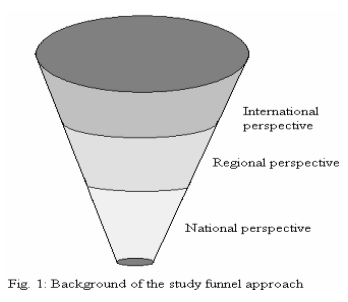The background to the study can be referred to as a “rough road” towards the statement of the problem. It provides the description of the research problem from an international, national to local context. It puts the problem in the correct perspective in order to provide the root or the genesis of the problem. It should be detailed enough so as to make the research problem emerge clearly. For example, the title of the study could be: Involving prefects in the governance of public secondary schools in Nyeri Municipality (Kenya). In developing the background of the study, the researcher is expected to discuss in general about the wider problem, that is “prefects in the school governance”. Thus, the background to the stated study could be developed as follows:
The rapid expansion of student enrolments in most African countries since the attainment of political independence, coupled with inadequate resources to cope with the ever-increasing demand for educational provision, has made school management a much more complex and difficult enterprise now than a few decades ago. To ensure effective and successful management, the school head must not only be innovative, resourceful and dynamic, but also able to interact well with people both within and outside the school – staff and pupils, parents, members of the Parent-Teacher Association and many other members of the community – all of whom need to be brought, in some way or other, into decision-making processes (UNESCO, 1995).
The increased enrolment in Kenyaschools since independence in 1963 coupled with an ever-increasing demand for quality education has made school governance a more complex undertaking than ever before. For the purpose of achieving success as a manager, the school head must create an environment for participatory democracy in the running of the school. Mbiti (1974) explaining about the participation of students in school governance put it that it is inevitable because students are in closer touch with each other through peer interaction than the staff is with them.
The position of prefect is a position of responsibility and one, which provides an important connection between pupils and staff. Becoming a prefect is a valuable goal and the position of prefect forms a valuable part of a pupil’s personal development, opening their mind to new levels of responsibility and participation in a very positive way. Prefects are a tremendous help to the school and play a particularly important role in mentoring younger pupils (Monitor, 1999). They are delegated duties concerned with day-to-day life in school. These include coordination of co-curricular activities, dealing with minor cases of discipline and taking responsibility of students’ welfare, They also carry out supervision of learning activities after school for junior pupils and checking attendants (Ozigi, 1995).
From the background, we note that the problem related to school management was discussed in general starting from international to local level. For instance, it is noted in the study that “The rapid expansion of student enrolments in most African countries since the attainment of political independence, coupled with inadequate resources to cope with the ever-increasing demand for educational provision, has made school management a much more complex and difficult enterprise now than a few decades ago.”
The background should be developed in such a way that it smoothly leads to the statement of the problem. The background to the study is funnel shaped. It is developed from international, regional to national perspectives. See Fig 1.
While taking this approach, care should be taken to tie the main problem of the study (dependent variable) with the predictors of the problem (independent variables). A good background of the study smoothly leads to the statement of the problem based on the real social need on the ground or knowledge gap. Read more…

